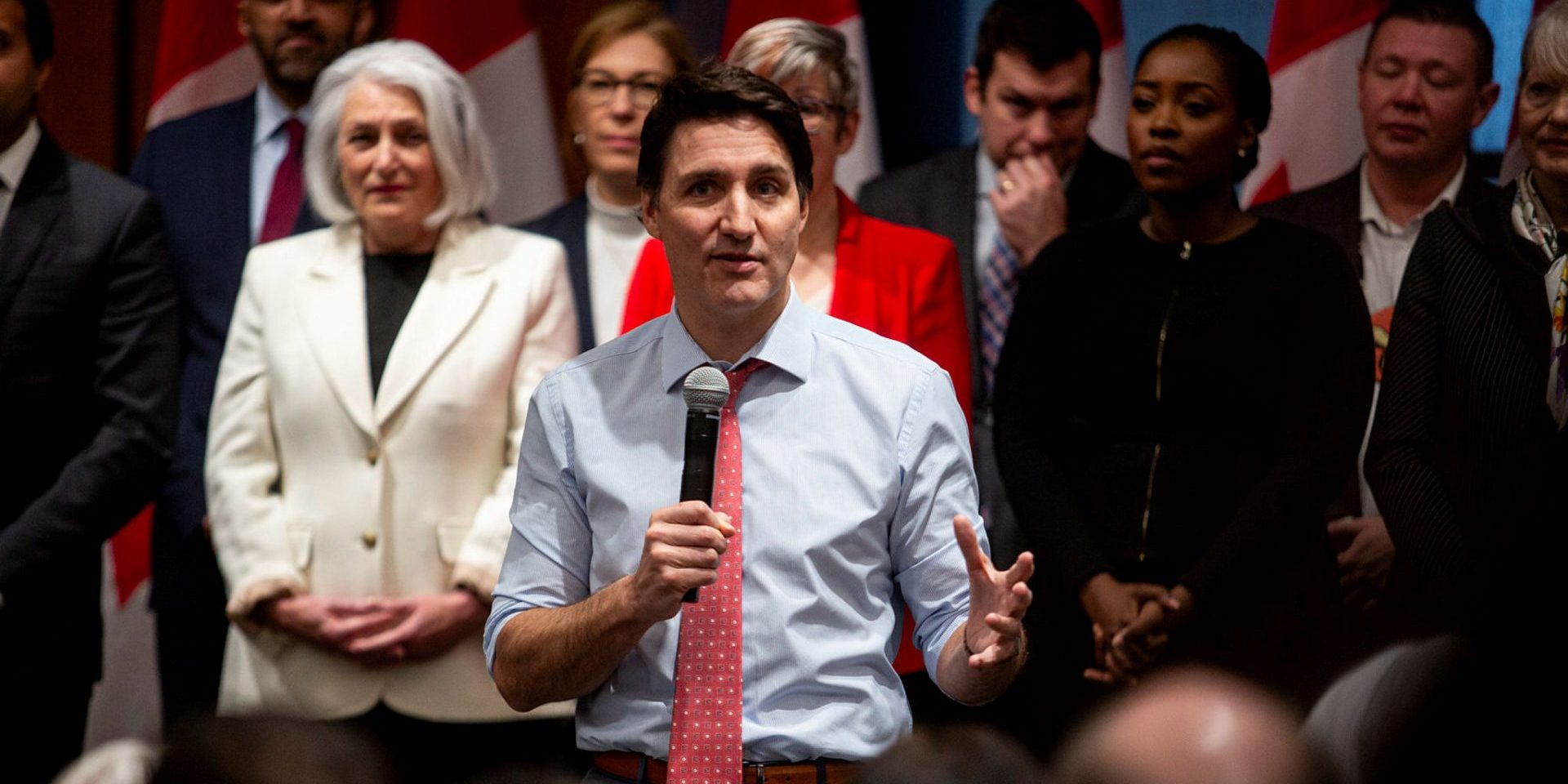Atlantic Liberals feel ‘dramatic’ drag of Trudeau’s unpopularity, says pollster

The growing assertiveness of Atlantic Liberals in expressing their concerns about Prime Minister Justin Trudeau’s leadership shows they “have their finger on the pulse” of the clear electoral threat they face, says a Halifax-based pollster.
Margaret Brigley, CEO of Narrative Research, told The Hill Times that Liberals have “a lot to lose” in the region, and a number of seats are at stake.
That pressure may be driving some of these MPs to press Trudeau (Papineau, Que.) to reconsider whether he is the best choice to lead the party in the next campaign.
On Oct. 15, Liberal MP Sean Casey (Charlottetown, P.E.I.) became the latest Atlantic MP to publicly challenge Trudeau, telling CBC News, “The message that I’ve been getting loud and clear—and more and more strongly as time goes by—is that it is time for [Trudeau] to go. And I agree.”

That news came after a series of reports from The Toronto Star and other outlets of growing caucus discontent. The Star reported that at the Oct. 9 Liberal national caucus meeting, Liberal MP Kody Blois (Kings-Hants, N.S.), chair of the Atlantic caucus, came to the microphone and remarked that “Atlantic caucus had a difficult, frank and open conversation about the future of the party.” Several news reports have said there is a document circulating among MPs with a growing list of signatories asking the prime minister to reconsider his future.
The Liberals won 24 of the region’s 32 seats in 2021, and five MPs have made public their plans not to run again in the next election, including Wayne Long (Saint John—Rothesay, N.B.) and Ken McDonald (Avalon, N.L.) who have also openly questioned Trudeau’s leadership on previous occasions. Casey says he intends to be on the next ballot when Canadians go to the polls.
Public opinion research shows that Trudeau may be a drag on the party’s Atlantic fortunes in the next campaign instead of giving local candidates a boost as he did when the party swept all 32 of the region’s seats in 2015.

Brigley said that on the question of leadership, the downward trend line since 2015 is “quite dramatic.”
In its latest Atlantic Quarterly survey, conducted in August, Narrative Research found that just 21 per cent of voters in the region prefer Trudeau as prime minister. That’s the lowest he has polled in this survey since coming to power. Meanwhile, 32 per cent said they would prefer Conservative Leader Pierre Poilievre (Carleton, Ont.), and 17 per cent chose NDP leader Jagmeet Singh (Burnaby South, B.C.).
That poll also found that 61 per cent of Atlantic Canadians are currently dissatisfied with the direction of the federal government. In overall voting intentions, 43 per cent said they would vote Conservative, 32 per cent Liberal, and 16 per cent NDP.
Brigely said the top three issues identified by voters in the region—cost of living, housing, and heath care—were in line with those identified by voters across the country.
Carbon tax 'schism' reveals urban-rural divide
Alex Marland, a political science professor at Nova Scotia’s Acadia University—where he holds the Jarisowsly Chair in Trust and Political Leadership—said the news to emerge from the Atlantic caucus may highlight a larger urban-rural divide playing out across Canada.
“I think that it's too easy to dismiss it as a regional thing,” said Marland “I think this is actually an internal class cleavage.”
He said the “schism on the carbon tax” has revealed a stark divide between “urban reality” compared to “daily life in rural areas.”
Marland said Atlantic Canada's geography—where even the urban centres have relatively little in the way of mass transit—means voters are more likely to be sensitive to carbon pricing, leading MPs from this region to be more unified in opposing the policy.
Atlantic MPs form a large share of the rural voices within the caucus. They come from one of the few parts of the country where Liberals have remained competitive with rural voters.
“So it makes sense that when the Atlantic Canada caucus is getting together, they are sharing concerns they're hearing from their constituents, and by and large, when it comes to the carbon tax, it's all going to be frustration,” said Marland.

A veteran Liberal organizer in the region, who spoke on a not-for-attribution basis in order to candidly offer their views, said the growing discontent reflects the fact that the Trudeau government has leaned too heavily on advisers who cut their teeth working in Ontario politics at Queen's Park.
He said the Atlantic caucus—and by extension Atlantic Canadians—has never felt represented in the current government. He said despite the sizable share of MPs Atlantic Canada has sent to Ottawa during the Trudeau years, there have been few Atlantic Canadians in the senior ranks at PMO. While Trudeau's former principal secretary Gerry Butts is from Cape Breton, N.S., the source said Butts has not lived there as an adult, and does not understand the region.
The source said a lack of personal working relationships has led to a lack of understanding of issues that drive Atlantic voters, and to a caucus that feels the region's issues have not been prioritized.
Nick McRoberts, a former Liberal staffer from Prince Edward Island, said the Atlantic caucus may be “trying to play a little bit of the clout that they have” that may not have been “heard to date.”
He said the concerns these MPs are reflecting are ones that exist across the country.
“These aren't necessarily Atlantic issues that are coming to the surface,” said McRoberts, who is now a vice-president at public affairs agency Winston Wilmont. “This is a national issue that's being felt by the Liberal Party, and by their MPs to question and push for new leadership.”
He said Atlantic MPs may be hearing this message more directly.

“These are small, small communities in comparison to the rest of the country,” said McRoberts. “They're places where everyone knows each other, and MPs need to be connected to their neighbours.”
He said when MPs visit constituents' doorsteps “they're being met with people saying … ‘everything's too expensive,’ and then they're also questioning personality and leadership qualities that they're seeing on a national scale from the prime minister.”
“That's being taken back to caucus,” he said.
He noted the key role Atlantic Canada played in delivering a Liberal majority in 2015, and keeping the party in power with a minority in the subsequent two campaigns.
However, said McRoberts, he does not believe these events are likely to lead to a change in leadership, and that the prime minister has been clear about his intention to stay on.
“I think, unfortunately or fortunately, whichever side you're on, this is going to wither on the vine,” said McRoberts.
'Strength in numbers' gives leadership challenge legs
However, Marland, who studies party discipline, said the group of Atlantic MPs “absolutely” has the capacity to mount a credible challenge.

But it’s less to do with their regional base, and more about the sheer numbers they represent within the Liberal caucus, said Marland.
“One of the lessons that I've learned about from talking to politicians and others is strength in numbers,” said Marland, who is the author of Whipped: Party Discipline in Canada.
In the 153-member Liberal caucus, 23 MPs—or about 15 per cent—are from Atlantic Canada. By comparison, the Liberals only have 14 MPs from the entire province of British Columbia. The region may take on even greater significance for the Liberals if the next election becomes about retaining a base to rebuild upon.
Marland said individual MPs are usually “terrified of being singled out or going on their own” when challenging a leader, but the Atlantic caucus is large enough to provide dissidents some mutual backup.
“It's really, really hard for any leader to deal with a groundswell of many caucus members splitting apart the rest of the caucus,” said Marland.
He said a looming election deadline can also push MPs to become more aggressive.
“The closer you get to an election when their jobs are on the line, the more the calculus shifts.”
icampbell@hilltimes.com
The Hill Times






 LICENSING
LICENSING PODCAST
PODCAST ALERTS
ALERTS













